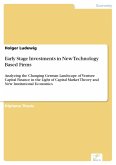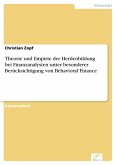Inhaltsangabe:Abstract: This paper investigates the quality of financial analysts' earnings forecasts for companies which conducted initial public offerings (IPOs) during the years 1997 to 1999. The Neue Markt in Frankfurt offers a good setting to also study the development of a young market from the beginning of its operation onwards. I find support for the notion that initial returns and analysts' forecast accuracy are negatively related. I find that analysts' forecasts were by no means accurate. Mean forecast deviation, measured as percent deviation from actual earnings per share for the fiscal year, is 186.61 percent for the average broker. The sample is inhibited by serious availability problems, but all the same allows significant findings. Inhaltsverzeichnis:Table of Contents: 1.Introduction5 2.Literature10 2.1Banking systems ¿ the German framework10 2.2Conflict of interest as regulated in the German legal system12 2.3The quality of analysts' forecasts and conflicts of interest16 2.4The long-run underperformance phenomenon23 2.5Predicting the aftermarket performance of IPOs27 2.6Summary39 3.Data41 4.Method49 5.Empirical Results53 5.1IPOs differentiated by year of issue53 5.2Disparities of actual values58 5.3Earning per share found in annual reports as basis62 5.4IPOs differentiated by industry classification67 5.5Percentage deviations differentiated by Brokers73 6.Additional Results80 6.1Large German banks ¿ seasoned vs. IPO companies80 6.2The time factor86 6.3The relevance of accounting policy88 7.Summary and Conclusion92 8.References95
Dieser Download kann aus rechtlichen Gründen nur mit Rechnungsadresse in A, B, BG, CY, CZ, D, DK, EW, E, FIN, F, GR, HR, H, IRL, I, LT, L, LR, M, NL, PL, P, R, S, SLO, SK ausgeliefert werden.









